Deck 2: Limits and Their Properties
Question
Question
Question
Question
Question
Question
Question
Question
Question
Question
Question
Question
Question
Question
Question
Question
Question
Question
Question
Question
Question
Question
Question
Question
Question
Question
Question
Question
Question
Question
Question
Question
Question
Question
Question
Question
Question
Question
Question
Question
Question
Question
Question
Question
Question
Question
Question
Question
Question
Question
Question
Question
Question
Question
Question
Question
Question
Question
Question
Question
Question
Question
Question
Question
Question
Question
Question
Question
Question
Question
Question
Question
Question
Question
Question
Question
Question
Question
Question
Question

Unlock Deck
Sign up to unlock the cards in this deck!
Unlock Deck
Unlock Deck
1/85
Play
Full screen (f)
Deck 2: Limits and Their Properties
1
Suppose that  . Find the following limit.
. Find the following limit. 
A) -1
B) 1
C) 3
D) 0
E) 2
 . Find the following limit.
. Find the following limit. 
A) -1
B) 1
C) 3
D) 0
E) 2
B
2
Find the limit (if it exists). 
A) 0
B)
C)
D)
E) Limit does not exist.

A) 0
B)

C)

D)

E) Limit does not exist.
D
3
Suppose that  . Find the following limit.
. Find the following limit. 
A) -5
B) -55
C) 55
D) -11c
E) -11
 . Find the following limit.
. Find the following limit. 
A) -5
B) -55
C) 55
D) -11c
E) -11
C
4
Find the following limit (if it exists). Write a simpler function that agrees with the given function at all but one point.  7
7
A)
B)
C)
D)
E) does not exist
 7
7
A)

B)

C)

D)

E) does not exist

Unlock Deck
Unlock for access to all 85 flashcards in this deck.
Unlock Deck
k this deck
5
Use a graphing utility to graph the function  and determine the following one-sided limit.
and determine the following one-sided limit. 
A)
B) 6
C) -6
D)
E) 0
 and determine the following one-sided limit.
and determine the following one-sided limit. 
A)

B) 6
C) -6
D)

E) 0

Unlock Deck
Unlock for access to all 85 flashcards in this deck.
Unlock Deck
k this deck
6
A ring has a inner circumference of 9 centimeters. If the ring's inner circumference can vary between 8.5 centimeters and 9.5 centimeters how can the radius vary? Round your answer to five decimal places.
A) Radius can vary between 7.32046 centimeters and 9.14424 centimeters.
B) Radius can vary between 1.64488 centimeters and 1.73895 centimeters.
C) Radius can vary between 1.35282 centimeters and 1.51197 centimeters.
D) Radius can vary between 2.70563 centimeters and 3.02394 centimeters.
E) Radius can vary between 0.93239 centimeter and 1.93239 centimeters.
A) Radius can vary between 7.32046 centimeters and 9.14424 centimeters.
B) Radius can vary between 1.64488 centimeters and 1.73895 centimeters.
C) Radius can vary between 1.35282 centimeters and 1.51197 centimeters.
D) Radius can vary between 2.70563 centimeters and 3.02394 centimeters.
E) Radius can vary between 0.93239 centimeter and 1.93239 centimeters.

Unlock Deck
Unlock for access to all 85 flashcards in this deck.
Unlock Deck
k this deck
7
Find the constant a and b such that the function 
Is continuous on the entire real line.
A) a = 3, b = 0
B) a = 3, b = -3
C) a = -3, b = -3
D) a = -3, b = 3
E) a = 3, b = 3

Is continuous on the entire real line.
A) a = 3, b = 0
B) a = 3, b = -3
C) a = -3, b = -3
D) a = -3, b = 3
E) a = 3, b = 3

Unlock Deck
Unlock for access to all 85 flashcards in this deck.
Unlock Deck
k this deck
8
Find the limit. 
A) 1
B)
C) 0
D)
E) -1

A) 1
B)

C) 0
D)

E) -1

Unlock Deck
Unlock for access to all 85 flashcards in this deck.
Unlock Deck
k this deck
9
Find  where
where  .
.
A) 1
B) 4
C) -5
D) 1
E) Limit does not exist.
 where
where  .
. A) 1
B) 4
C) -5
D) 1
E) Limit does not exist.

Unlock Deck
Unlock for access to all 85 flashcards in this deck.
Unlock Deck
k this deck
10
A 25-foot ladder is leaning against a house (see figure). If the base of the ladder is pulled away from the house at a rate of 2 feet per second, the top will move down the wall at a rate of  where x is the distance between the base of the ladder and the house. Find the limit of r as
where x is the distance between the base of the ladder and the house. Find the limit of r as  .
. 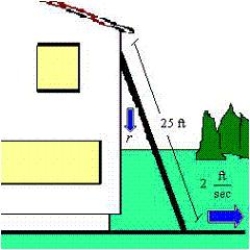
A)
B) 50
C) 0
D)
E) 25
 where x is the distance between the base of the ladder and the house. Find the limit of r as
where x is the distance between the base of the ladder and the house. Find the limit of r as  .
. 
A)

B) 50
C) 0
D)

E) 25

Unlock Deck
Unlock for access to all 85 flashcards in this deck.
Unlock Deck
k this deck
11
Find the vertical asymptotes (if any) of the function  .
.
A)
B)
C)
D)
E) no vertical asymptotes
 .
. A)

B)

C)

D)

E) no vertical asymptotes

Unlock Deck
Unlock for access to all 85 flashcards in this deck.
Unlock Deck
k this deck
12
A sphere has a volume of 4.12 cubic inches. What is the radius of the sphere? Round your answer to four decimal places.
A) 0.9945 inch
B) 1.5787 inches
C) 0.9918 inch
D) 1.9835 inches
E) 1.7988 inches
A) 0.9945 inch
B) 1.5787 inches
C) 0.9918 inch
D) 1.9835 inches
E) 1.7988 inches

Unlock Deck
Unlock for access to all 85 flashcards in this deck.
Unlock Deck
k this deck
13
A long distance phone service charges $0.35 for the first 8 minutes and $0.05 for each additional minute or fraction thereof. Use the greatest integer function to write the cost C of a call in terms of time t (in minutes).
A)
B)
C)
D)
E)
A)

B)

C)

D)

E)


Unlock Deck
Unlock for access to all 85 flashcards in this deck.
Unlock Deck
k this deck
14
Suppose that  and
and  . Find the following limit.
. Find the following limit. 
A)
B)
C)
D)
E) does not exist
 and
and  . Find the following limit.
. Find the following limit. 
A)

B)

C)

D)

E) does not exist

Unlock Deck
Unlock for access to all 85 flashcards in this deck.
Unlock Deck
k this deck
15
Find all the vertical asymptotes (if any) of the graph of the function  .
.
A) x = -1
B) x = 5
C) x = 1, -1
D) x = 1
E) no vertical asymptotes
 .
. A) x = -1
B) x = 5
C) x = 1, -1
D) x = 1
E) no vertical asymptotes

Unlock Deck
Unlock for access to all 85 flashcards in this deck.
Unlock Deck
k this deck
16
Use the graph to find the limit. 
A)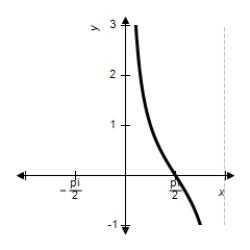
B)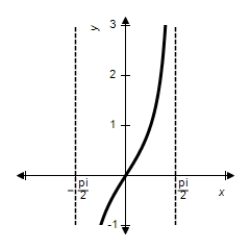
C)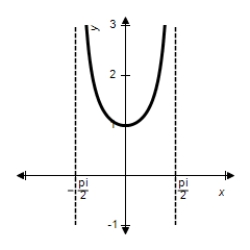
D)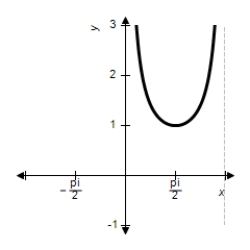
E) The limit does not exist.

A)

B)

C)

D)

E) The limit does not exist.

Unlock Deck
Unlock for access to all 85 flashcards in this deck.
Unlock Deck
k this deck
17
Let  Determine the following limit.
Determine the following limit.
 Determine the following limit.
Determine the following limit.
Unlock Deck
Unlock for access to all 85 flashcards in this deck.
Unlock Deck
k this deck
18
Determine the limit (if it exists). 
A) 0
B) 1
C) 2
D) ∞
E) does not exist

A) 0
B) 1
C) 2
D) ∞
E) does not exist

Unlock Deck
Unlock for access to all 85 flashcards in this deck.
Unlock Deck
k this deck
19
Find the x-values (if any) at which the function  is not continuous. Which of the discontinuities are removable?
is not continuous. Which of the discontinuities are removable?
A) 10 and -10, removable
B) discontinuous everywhere 0 00
C) continuous everywhere 0 00
D) 10 and -10, not removable
E) 0, removable
 is not continuous. Which of the discontinuities are removable?
is not continuous. Which of the discontinuities are removable? A) 10 and -10, removable
B) discontinuous everywhere 0 00
C) continuous everywhere 0 00
D) 10 and -10, not removable
E) 0, removable

Unlock Deck
Unlock for access to all 85 flashcards in this deck.
Unlock Deck
k this deck
20
Let  Determine the following limit.
Determine the following limit.
 Determine the following limit.
Determine the following limit.
Unlock Deck
Unlock for access to all 85 flashcards in this deck.
Unlock Deck
k this deck
21
Find the limit (if it exists). Note that  represents the greatest integer function.
represents the greatest integer function. 
A) -109
B) 119
C) -119
D) 109
E) does not exist
 represents the greatest integer function.
represents the greatest integer function. 
A) -109
B) 119
C) -119
D) 109
E) does not exist

Unlock Deck
Unlock for access to all 85 flashcards in this deck.
Unlock Deck
k this deck
22
Complete the table and use the result to estimate the limit. 








A)
B)
C)
D)
E)









A)

B)

C)

D)

E)


Unlock Deck
Unlock for access to all 85 flashcards in this deck.
Unlock Deck
k this deck
23
Find the value of c guaranteed by the Intermediate Value Theorem. 
A) 7
B) 2
C) 1
D) 5
E) 6

A) 7
B) 2
C) 1
D) 5
E) 6

Unlock Deck
Unlock for access to all 85 flashcards in this deck.
Unlock Deck
k this deck
24
Suppose that  and
and  . Find the following limit.
. Find the following limit. 
A) 0
B) -4
C) -9
D) -17
E) 52
 and
and  . Find the following limit.
. Find the following limit. 
A) 0
B) -4
C) -9
D) -17
E) 52

Unlock Deck
Unlock for access to all 85 flashcards in this deck.
Unlock Deck
k this deck
25
Find the following limit if it exists:  . Use
. Use  when appropriate.
when appropriate.
A)
B) -4
C) 1
D)
E) does not exist
 . Use
. Use  when appropriate.
when appropriate. A)

B) -4
C) 1
D)

E) does not exist

Unlock Deck
Unlock for access to all 85 flashcards in this deck.
Unlock Deck
k this deck
26
A petrol car is parked 35 feet from a long warehouse (see figure). The revolving light on top of the car turns at a rate of  revolution per second. The rate at which the light beam moves along the wall is
revolution per second. The rate at which the light beam moves along the wall is  ft/sec. Find the rate r when
ft/sec. Find the rate r when  is
is  .
. 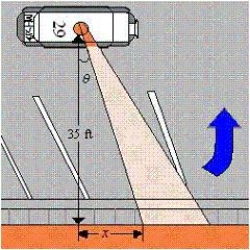
A) ft/sec
ft/sec
B) ft/sec
ft/sec
C) ft/sec
ft/sec
D) ft/sec
ft/sec
E) ft/sec
ft/sec
 revolution per second. The rate at which the light beam moves along the wall is
revolution per second. The rate at which the light beam moves along the wall is  ft/sec. Find the rate r when
ft/sec. Find the rate r when  is
is  .
. 
A)
 ft/sec
ft/secB)
 ft/sec
ft/secC)
 ft/sec
ft/secD)
 ft/sec
ft/secE)
 ft/sec
ft/sec
Unlock Deck
Unlock for access to all 85 flashcards in this deck.
Unlock Deck
k this deck
27
Determine the limit (if it exists). 
A) 8
B) 1
C) 0
D) -2
E) does not exist

A) 8
B) 1
C) 0
D) -2
E) does not exist

Unlock Deck
Unlock for access to all 85 flashcards in this deck.
Unlock Deck
k this deck
28
A petrol car is parked 65 feet from a long warehouse (see figure). The revolving light on top of the car turns at a rate of  revolution per second. The rate at which the light beam moves along the wall is
revolution per second. The rate at which the light beam moves along the wall is  ft/sec. Find the limit of r as
ft/sec. Find the limit of r as  .
. 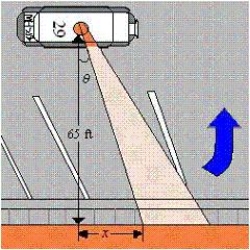
A)
B)
C) 0
D) 65
E)
 revolution per second. The rate at which the light beam moves along the wall is
revolution per second. The rate at which the light beam moves along the wall is  ft/sec. Find the limit of r as
ft/sec. Find the limit of r as  .
. 
A)

B)

C) 0
D) 65
E)


Unlock Deck
Unlock for access to all 85 flashcards in this deck.
Unlock Deck
k this deck
29
Find the lmit. 
A)
B)
C)
D)
E) does not exist

A)

B)

C)

D)

E) does not exist

Unlock Deck
Unlock for access to all 85 flashcards in this deck.
Unlock Deck
k this deck
30
Find the x-values (if any) at which  is not continuous.
is not continuous.
A) f(x) is not continuous at x = 0 and f(x) has a removable discontinuity at x = 0.
B) f(x) is not continuous at x = 0, -2 and both the discontinuities are nonremovable.
C) f(x) is not continuous at x = -2 and f(x) has a removable discontinuity at x = -2.
D) f(x) is not continuous at x = 0, -2 and f(x) has a removable discontinuity at x = 0.
E) f(x) is continuous for all real x.
 is not continuous.
is not continuous. A) f(x) is not continuous at x = 0 and f(x) has a removable discontinuity at x = 0.
B) f(x) is not continuous at x = 0, -2 and both the discontinuities are nonremovable.
C) f(x) is not continuous at x = -2 and f(x) has a removable discontinuity at x = -2.
D) f(x) is not continuous at x = 0, -2 and f(x) has a removable discontinuity at x = 0.
E) f(x) is continuous for all real x.

Unlock Deck
Unlock for access to all 85 flashcards in this deck.
Unlock Deck
k this deck
31
Find the limit. 
A)
B)
C)
D)
E)

A)

B)

C)

D)

E)


Unlock Deck
Unlock for access to all 85 flashcards in this deck.
Unlock Deck
k this deck
32
Decide whether the following problem can be solved using precalculus, or whether calculus is required. If the problem can be solved using precalculus, solve it. If the problem seems to require calculus, use a graphical or numerical approach to estimate the solution.
A cyclist is riding on a path whose elevation is modeled by the function wherexand
wherexand  are measured in miles. Find the rate of change of elevation when x= 3.
are measured in miles. Find the rate of change of elevation when x= 3. 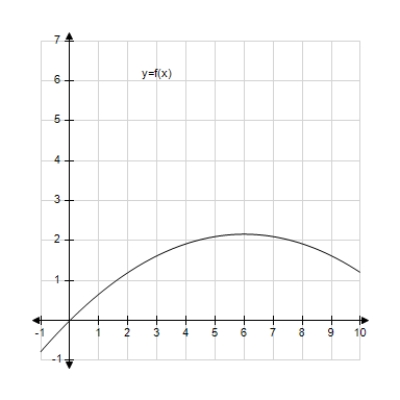
A) precalculus, 0.06
B) calculus, 0.18
C) calculus, 0.36
D) calculus, 0.06
E) precalculus, 0.18
A cyclist is riding on a path whose elevation is modeled by the function
 wherexand
wherexand  are measured in miles. Find the rate of change of elevation when x= 3.
are measured in miles. Find the rate of change of elevation when x= 3. 
A) precalculus, 0.06
B) calculus, 0.18
C) calculus, 0.36
D) calculus, 0.06
E) precalculus, 0.18

Unlock Deck
Unlock for access to all 85 flashcards in this deck.
Unlock Deck
k this deck
33
A 30-foot ladder is leaning against a house (see figure). If the base of the ladder is pulled away from the house at a rate of 2 feet per second, the top will move down the wall at a rate of  , where x is the distance between the base of the ladder and the house. Find the rate r when x is 18 feet.
, where x is the distance between the base of the ladder and the house. Find the rate r when x is 18 feet. 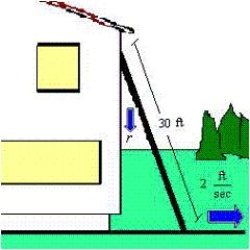
A) r = ft/sec
ft/sec
B) r = ft/sec
ft/sec
C)
 ft/sec
ft/sec
D) r = ft/sec
ft/sec
E) r = ft/sec
ft/sec
 , where x is the distance between the base of the ladder and the house. Find the rate r when x is 18 feet.
, where x is the distance between the base of the ladder and the house. Find the rate r when x is 18 feet. 
A) r =
 ft/sec
ft/secB) r =
 ft/sec
ft/secC)

 ft/sec
ft/secD) r =
 ft/sec
ft/secE) r =
 ft/sec
ft/sec
Unlock Deck
Unlock for access to all 85 flashcards in this deck.
Unlock Deck
k this deck
34
Use the rectangles in the following graph to approximate the area of the region bounded by  .
. 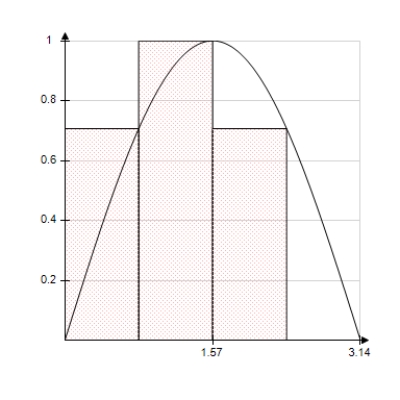
A) 0.9481
B) 1.8961
C) 3.7922
D) 1.4221
E) 1.2704
 .
. 
A) 0.9481
B) 1.8961
C) 3.7922
D) 1.4221
E) 1.2704

Unlock Deck
Unlock for access to all 85 flashcards in this deck.
Unlock Deck
k this deck
35
Let  and
and  . Find the limit.
. Find the limit. 
A)
B)
C)
D)
E)
 and
and  . Find the limit.
. Find the limit. 
A)

B)

C)

D)

E)


Unlock Deck
Unlock for access to all 85 flashcards in this deck.
Unlock Deck
k this deck
36
Find the limit (if it exists). 
A) Limit does not exist.
B) 0
C) 3
D) 4
E) 9

A) Limit does not exist.
B) 0
C) 3
D) 4
E) 9

Unlock Deck
Unlock for access to all 85 flashcards in this deck.
Unlock Deck
k this deck
37
Find the limit. 
A) 1
B) 0
C) -1
D)
E)

A) 1
B) 0
C) -1
D)

E)


Unlock Deck
Unlock for access to all 85 flashcards in this deck.
Unlock Deck
k this deck
38
Determine the following limit.

Unlock Deck
Unlock for access to all 85 flashcards in this deck.
Unlock Deck
k this deck
39
Decide whether the following problem can be solved using precalculus, or whether calculus is required. If the problem can be solved using precalculus, solve it. If the problem seems to require calculus, use a graphical or numerical approach to estimate the solution.
Find the area of the shaded region bounded by the triangle with vertices (0,0), (7,8), (15,0).
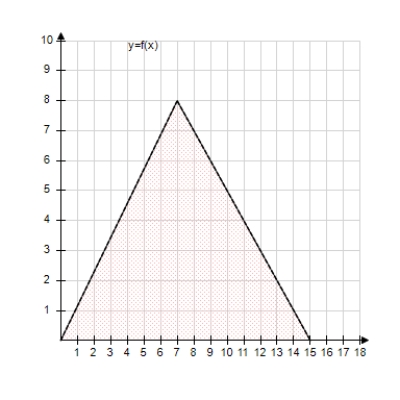
A) precalculus , 120
B) calculus , 180
C) precalculus , 60
D) precalculus , 180
E) calculus , 120
Find the area of the shaded region bounded by the triangle with vertices (0,0), (7,8), (15,0).

A) precalculus , 120
B) calculus , 180
C) precalculus , 60
D) precalculus , 180
E) calculus , 120

Unlock Deck
Unlock for access to all 85 flashcards in this deck.
Unlock Deck
k this deck
40
Find the x-values (if any) at which the function  is not continuous. Which of the discontinuities are removable?
is not continuous. Which of the discontinuities are removable?
A) no points of discontinuity
B) x = -9 (not removable), x = -5 (removable)
C) x = -9 (removable), x = -5 (not removable)
D) no points of continuity
E) x = -9 (not removable), x = -5 (not removable)
 is not continuous. Which of the discontinuities are removable?
is not continuous. Which of the discontinuities are removable? A) no points of discontinuity
B) x = -9 (not removable), x = -5 (removable)
C) x = -9 (removable), x = -5 (not removable)
D) no points of continuity
E) x = -9 (not removable), x = -5 (not removable)

Unlock Deck
Unlock for access to all 85 flashcards in this deck.
Unlock Deck
k this deck
41
Suppose that  and
and  . Find the following limit.
. Find the following limit. 
A) -3
B) 5
C) 24
D) -11
E) 0
 and
and  . Find the following limit.
. Find the following limit. 
A) -3
B) 5
C) 24
D) -11
E) 0

Unlock Deck
Unlock for access to all 85 flashcards in this deck.
Unlock Deck
k this deck
42
Determine the following limit.

Unlock Deck
Unlock for access to all 85 flashcards in this deck.
Unlock Deck
k this deck
43
Use the rectangles in the graph given below to approximate the area of the region bounded by  . Round your answer to three decimal places.
. Round your answer to three decimal places. 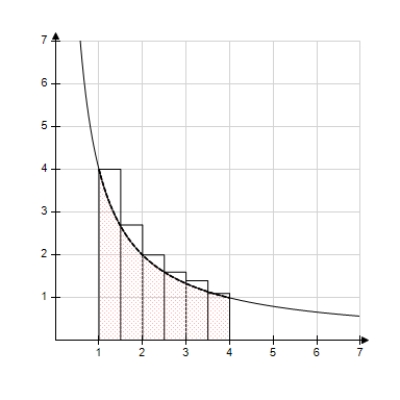
A) 2.481 units2
B) 6.371units2
C) 3.585units2
D) 6.872units2
E) 6.903units2
 . Round your answer to three decimal places.
. Round your answer to three decimal places. 
A) 2.481 units2
B) 6.371units2
C) 3.585units2
D) 6.872units2
E) 6.903units2

Unlock Deck
Unlock for access to all 85 flashcards in this deck.
Unlock Deck
k this deck
44
Use the graph as shown to determine the following limits, and discuss the continuity of the function at x= 4.
(i) (ii)
(ii)  (iii)
(iii) 
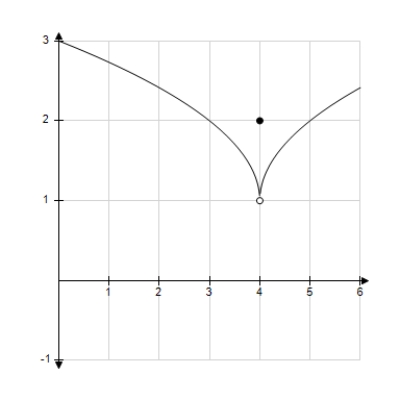
A) 1, 1, 1, not continuous
B) 2, 2, 2, continuous
C) 1, 1, 1, continuous
D) 2, 2, 2, not continuous
E) 0, 0, 0, not continuous
(i)
 (ii)
(ii)  (iii)
(iii) 

A) 1, 1, 1, not continuous
B) 2, 2, 2, continuous
C) 1, 1, 1, continuous
D) 2, 2, 2, not continuous
E) 0, 0, 0, not continuous

Unlock Deck
Unlock for access to all 85 flashcards in this deck.
Unlock Deck
k this deck
45
Find the limit. 
A)
B)
C) -12
D) 6
E) 12

A)

B)

C) -12
D) 6
E) 12

Unlock Deck
Unlock for access to all 85 flashcards in this deck.
Unlock Deck
k this deck
46
Find the limit (if it exists). 
A)
B)
C)
D)
E) does not exist

A)

B)

C)

D)

E) does not exist

Unlock Deck
Unlock for access to all 85 flashcards in this deck.
Unlock Deck
k this deck
47
Find the limit (if it exists). 
A)
B)
C)
D)
E)

A)

B)

C)

D)

E)


Unlock Deck
Unlock for access to all 85 flashcards in this deck.
Unlock Deck
k this deck
48
Suppose that  and
and  . Find the following limit.
. Find the following limit. 
A) 9
B) -3
C) -21
D) -12
E) 108
 and
and  . Find the following limit.
. Find the following limit. 
A) 9
B) -3
C) -21
D) -12
E) 108

Unlock Deck
Unlock for access to all 85 flashcards in this deck.
Unlock Deck
k this deck
49
Use the graph as shown to determine the following limits, and discuss the continuity of the function at x= -4.
(i) (ii)
(ii)  (iii)
(iii) 
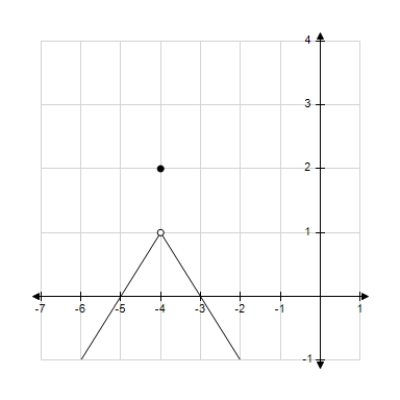
A) 2, 2, 2, continuous
B) 1, 1, 1, not continuous
C) 2, 2, 2, not continuous
D) -4, -4, -4, continuous
E) 1, 1, 1, continuous
(i)
 (ii)
(ii)  (iii)
(iii) 

A) 2, 2, 2, continuous
B) 1, 1, 1, not continuous
C) 2, 2, 2, not continuous
D) -4, -4, -4, continuous
E) 1, 1, 1, continuous

Unlock Deck
Unlock for access to all 85 flashcards in this deck.
Unlock Deck
k this deck
50
Find the x-values (if any) at which  is not continuous.
is not continuous.
A) f(x) is not continuous at x = -2 and the discontinuity is nonremovable.
B) f(x) is not continuous at x = 0 and the discontinuity is removable.
C) f(x) is continuous for all real x.
D) f(x) is not continuous at x = -2 and the discontinuity is removable.
E) f(x) is not continuous at x = 0, 2 and x = 0 is a removable discontinuity.
 is not continuous.
is not continuous. A) f(x) is not continuous at x = -2 and the discontinuity is nonremovable.
B) f(x) is not continuous at x = 0 and the discontinuity is removable.
C) f(x) is continuous for all real x.
D) f(x) is not continuous at x = -2 and the discontinuity is removable.
E) f(x) is not continuous at x = 0, 2 and x = 0 is a removable discontinuity.

Unlock Deck
Unlock for access to all 85 flashcards in this deck.
Unlock Deck
k this deck
51
Find the limit (if it exists). 
A)
B)
C) 0
D)
E) Limit does not exist

A)

B)

C) 0
D)

E) Limit does not exist

Unlock Deck
Unlock for access to all 85 flashcards in this deck.
Unlock Deck
k this deck
52
Find the limit. 
A)
B)
C)
D)
E)

A)

B)

C)

D)

E)


Unlock Deck
Unlock for access to all 85 flashcards in this deck.
Unlock Deck
k this deck
53
Complete the table and use the result to estimate the limit. 








A)
B)
C)
D)
E)









A)

B)

C)

D)

E)


Unlock Deck
Unlock for access to all 85 flashcards in this deck.
Unlock Deck
k this deck
54
Find the value of c guaranteed by the Intermediate Value Theorem. 
A) 1
B) 4
C) 6
D) 2
E) 5

A) 1
B) 4
C) 6
D) 2
E) 5

Unlock Deck
Unlock for access to all 85 flashcards in this deck.
Unlock Deck
k this deck
55
Decide whether the following problem can be solved using precalculus, or whether calculus is required. If the problem can be solved using precalculus, solve it. If the problem seems to require calculus, use a graphical or numerical approach to estimate the solution.
A cyclist is riding on a path whose elevation is modeled by the function where x and
where x and  are measured in miles. Find the rate of change of elevation when x = 3.
are measured in miles. Find the rate of change of elevation when x = 3.
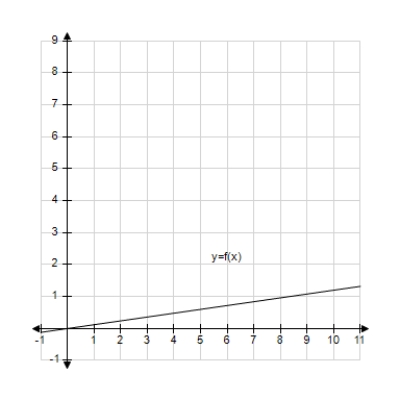
A) calculus, 0.72
B) precalculus, 0.12
C) calculus, 0.12
D) precalculus, 0.72
E) precalculus, 0.37
A cyclist is riding on a path whose elevation is modeled by the function
 where x and
where x and  are measured in miles. Find the rate of change of elevation when x = 3.
are measured in miles. Find the rate of change of elevation when x = 3.

A) calculus, 0.72
B) precalculus, 0.12
C) calculus, 0.12
D) precalculus, 0.72
E) precalculus, 0.37

Unlock Deck
Unlock for access to all 85 flashcards in this deck.
Unlock Deck
k this deck
56
Determine the following limit.

Unlock Deck
Unlock for access to all 85 flashcards in this deck.
Unlock Deck
k this deck
57
Use a graphing utility to graph the function  and determine the one-sided limit
and determine the one-sided limit  .
.
A)
B)
C) 0
D) 3
E) 2
 and determine the one-sided limit
and determine the one-sided limit  .
. A)

B)

C) 0
D) 3
E) 2

Unlock Deck
Unlock for access to all 85 flashcards in this deck.
Unlock Deck
k this deck
58
Find the x-values (if any) at which the function f(x) = 11x2 - 5x - 5 is not continuous. Which of the discontinuities are removable?
A) x = 2, removable
B) x = 0, removable
C)
D) continuous everywhere
E)
A) x = 2, removable
B) x = 0, removable
C)

D) continuous everywhere
E)


Unlock Deck
Unlock for access to all 85 flashcards in this deck.
Unlock Deck
k this deck
59
Find the vertical asymptotes (if any) of the function  .
.
A) x = 2
B) x = 6
C) x = -6
D) x = 12
E) x = -2
 .
. A) x = 2
B) x = 6
C) x = -6
D) x = 12
E) x = -2

Unlock Deck
Unlock for access to all 85 flashcards in this deck.
Unlock Deck
k this deck
60
Find the limit. 
A)
B)
C)
D)
E)

A)

B)

C)

D)

E)


Unlock Deck
Unlock for access to all 85 flashcards in this deck.
Unlock Deck
k this deck
61
Find the limit. 
A)
B)
C)
D)
E)

A)

B)

C)

D)

E)


Unlock Deck
Unlock for access to all 85 flashcards in this deck.
Unlock Deck
k this deck
62
A sphere has a volume of 4.0 cubic inches. If the sphere's volume can vary between 3.2 cubic inches and 5.5 cubic inches , how can the radius vary? Round your answer to five decimal places.
A) Radius can vary between 0.91416 inch and 1.09503 inches.
B) Radius can vary between 1.45113 inches and 1.73825 inches.
C) Radius can vary between 0.18475 inch and 2.48475 inches.
D) Radius can vary between 1.58533 inches and 2.07839 inches.
E) Radius can vary between 0.87404 inch and 1.14587 inches.
A) Radius can vary between 0.91416 inch and 1.09503 inches.
B) Radius can vary between 1.45113 inches and 1.73825 inches.
C) Radius can vary between 0.18475 inch and 2.48475 inches.
D) Radius can vary between 1.58533 inches and 2.07839 inches.
E) Radius can vary between 0.87404 inch and 1.14587 inches.

Unlock Deck
Unlock for access to all 85 flashcards in this deck.
Unlock Deck
k this deck
63
Find the limit (if it exists). Note that  represents the greatest integer function.
represents the greatest integer function. 
A) 13
B) Limit does not exist.
C) 12
D) 0
E) 11
 represents the greatest integer function.
represents the greatest integer function. 
A) 13
B) Limit does not exist.
C) 12
D) 0
E) 11

Unlock Deck
Unlock for access to all 85 flashcards in this deck.
Unlock Deck
k this deck
64
Let  and
and  . Find the limit.
. Find the limit. 
A)
B)
C)
D)
E)
 and
and  . Find the limit.
. Find the limit. 
A)

B)

C)

D)

E)


Unlock Deck
Unlock for access to all 85 flashcards in this deck.
Unlock Deck
k this deck
65
Find the constant a such that the function 
Is continuous on the entire real line.
A) 1
B) -7
C) 7
D) 14
E) -14

Is continuous on the entire real line.
A) 1
B) -7
C) 7
D) 14
E) -14

Unlock Deck
Unlock for access to all 85 flashcards in this deck.
Unlock Deck
k this deck
66
Decide whether the following problem can be solved using precalculus, or whether calculus is required. If the problem can be solved using precalculus, solve it. If the problem seems to require calculus, use a graphical or numerical approach to estimate the solution.
Find the distance traveled in 13 seconds by an object moving with a velocity of feet per second.
feet per second.
A) calculus, 162.3521 ft
B) precalculus, 163.7021 ft
C) calculus, 158.9412 ft
D) precalculus, 158.9412 ft
E) precalculus, 162.3521 ft
Find the distance traveled in 13 seconds by an object moving with a velocity of
 feet per second.
feet per second.
A) calculus, 162.3521 ft
B) precalculus, 163.7021 ft
C) calculus, 158.9412 ft
D) precalculus, 158.9412 ft
E) precalculus, 162.3521 ft

Unlock Deck
Unlock for access to all 85 flashcards in this deck.
Unlock Deck
k this deck
67
Determine the limit (if it exists). 
A) 0
B) 56
C) 11
D) 28
E) does not exist

A) 0
B) 56
C) 11
D) 28
E) does not exist

Unlock Deck
Unlock for access to all 85 flashcards in this deck.
Unlock Deck
k this deck
68
Decide whether the following problem can be solved using precalculus, or whether calculus is required. If the problem can be solved using precalculus, solve it. If the problem seems to require calculus, use a graphical or numerical approach to estimate the solution.
Find the area of the shaded region.
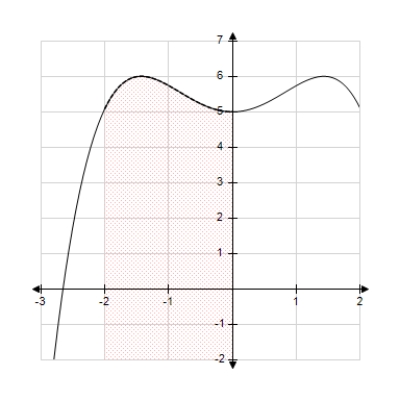
A) calculus , 15
B) precalculus , 15
C) precalculus , 18
D) calculus , 22
E) precalculus , 22
Find the area of the shaded region.

A) calculus , 15
B) precalculus , 15
C) precalculus , 18
D) calculus , 22
E) precalculus , 22

Unlock Deck
Unlock for access to all 85 flashcards in this deck.
Unlock Deck
k this deck
69
Use the graph to determine the following limits, and discuss the continuity of the function at x = -4. (i)  (ii)
(ii)  (iii)
(iii) 
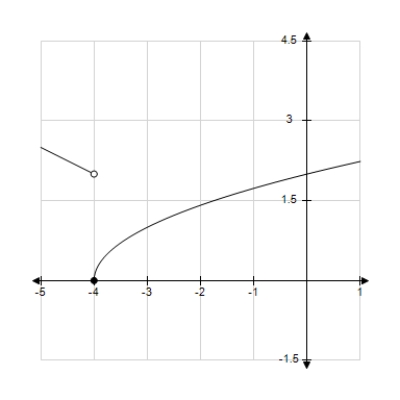
A) 2, -2, does not exist, not continuous
B) 2, 0, does not exist, not continuous
C) 0, 2, does not exist, not continuous
D) -4, 0, does not exist, not continuous
E) 0, 2, 0, continuous
 (ii)
(ii)  (iii)
(iii) 

A) 2, -2, does not exist, not continuous
B) 2, 0, does not exist, not continuous
C) 0, 2, does not exist, not continuous
D) -4, 0, does not exist, not continuous
E) 0, 2, 0, continuous

Unlock Deck
Unlock for access to all 85 flashcards in this deck.
Unlock Deck
k this deck
70
Consider the length of the graph of  from
from  to
to  . Approximate the length of the curve by finding the sum of the lengths of fiveline segments, as shown in following figure. Round your answer to two decimal places.
. Approximate the length of the curve by finding the sum of the lengths of fiveline segments, as shown in following figure. Round your answer to two decimal places. 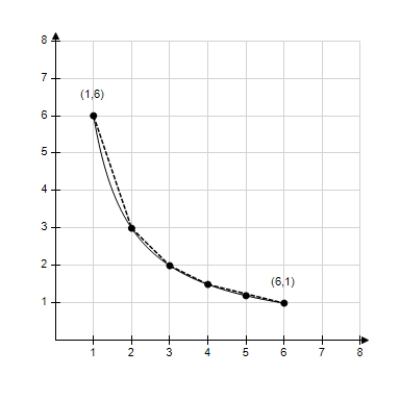
A) 7.76
B) 9.77
C) 7.07
D) 9.9
E) 8.76
 from
from  to
to  . Approximate the length of the curve by finding the sum of the lengths of fiveline segments, as shown in following figure. Round your answer to two decimal places.
. Approximate the length of the curve by finding the sum of the lengths of fiveline segments, as shown in following figure. Round your answer to two decimal places. 
A) 7.76
B) 9.77
C) 7.07
D) 9.9
E) 8.76

Unlock Deck
Unlock for access to all 85 flashcards in this deck.
Unlock Deck
k this deck
71
Find all values of c such that f is continuous on (-∞,∞). 
A) c = 2
B) c = 0
C)
D)
E)

A) c = 2
B) c = 0
C)

D)

E)


Unlock Deck
Unlock for access to all 85 flashcards in this deck.
Unlock Deck
k this deck
72
Find all vertical asymptotes (if any) of the function 
A) x = 1, 5
B) x = 1, 5, -4
C) x = -1, -5
D) x = 5
E) x = -5

A) x = 1, 5
B) x = 1, 5, -4
C) x = -1, -5
D) x = 5
E) x = -5

Unlock Deck
Unlock for access to all 85 flashcards in this deck.
Unlock Deck
k this deck
73
Complete the table and use the result to estimate the limit. 








A)
B)
C)
D)
E)









A)

B)

C)

D)

E)


Unlock Deck
Unlock for access to all 85 flashcards in this deck.
Unlock Deck
k this deck
74
Use the rectangles in the following graph to approximate the area of the region bounded by  .
. 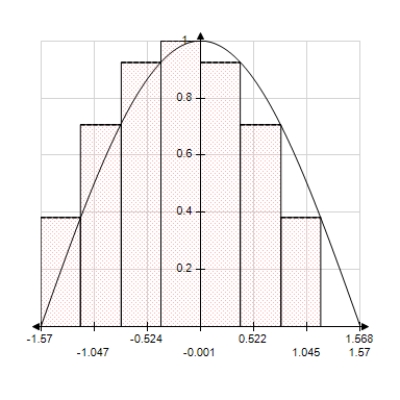
A) 3.9485
B) 2.6323
C) 1.9742
D) 1.4807
E) 0.9871
 .
. 
A) 3.9485
B) 2.6323
C) 1.9742
D) 1.4807
E) 0.9871

Unlock Deck
Unlock for access to all 85 flashcards in this deck.
Unlock Deck
k this deck
75
Find the limit (if it exists). 
A) 10
B)
C)
D)
E) .
.

A) 10
B)

C)

D)

E)
 .
.
Unlock Deck
Unlock for access to all 85 flashcards in this deck.
Unlock Deck
k this deck
76
Find the limit (if it exists). 
A)
B) 0
C) Limit does not exist.
D)
E)

A)

B) 0
C) Limit does not exist.
D)

E)


Unlock Deck
Unlock for access to all 85 flashcards in this deck.
Unlock Deck
k this deck
77
Let  and
and  . Find the limit.
. Find the limit. 
A)
B)
C)
D)
E)
 and
and  . Find the limit.
. Find the limit. 
A)

B)

C)

D)

E)


Unlock Deck
Unlock for access to all 85 flashcards in this deck.
Unlock Deck
k this deck
78
Find the limit. 
A)
B)
C)
D)
E)

A)

B)

C)

D)

E)


Unlock Deck
Unlock for access to all 85 flashcards in this deck.
Unlock Deck
k this deck
79
Find all the vertical asymptotes (if any) of the graph of the function  .
.
A) x = -2
B) x = 4
C) x = 0
D) x = 4, x = 0
E) no vertical asymptotes
 .
. A) x = -2
B) x = 4
C) x = 0
D) x = 4, x = 0
E) no vertical asymptotes

Unlock Deck
Unlock for access to all 85 flashcards in this deck.
Unlock Deck
k this deck
80
A ring has a inner circumference of 2 centimeters. What is the radius of the ring? Round your answer to four decimal places.
A) 0.1592 centimeter
B) 0.6366 centimeter
C) 0.3183 centimeter
D) 0.7979 centimeter
E) 0.4053 centimeter
A) 0.1592 centimeter
B) 0.6366 centimeter
C) 0.3183 centimeter
D) 0.7979 centimeter
E) 0.4053 centimeter

Unlock Deck
Unlock for access to all 85 flashcards in this deck.
Unlock Deck
k this deck


